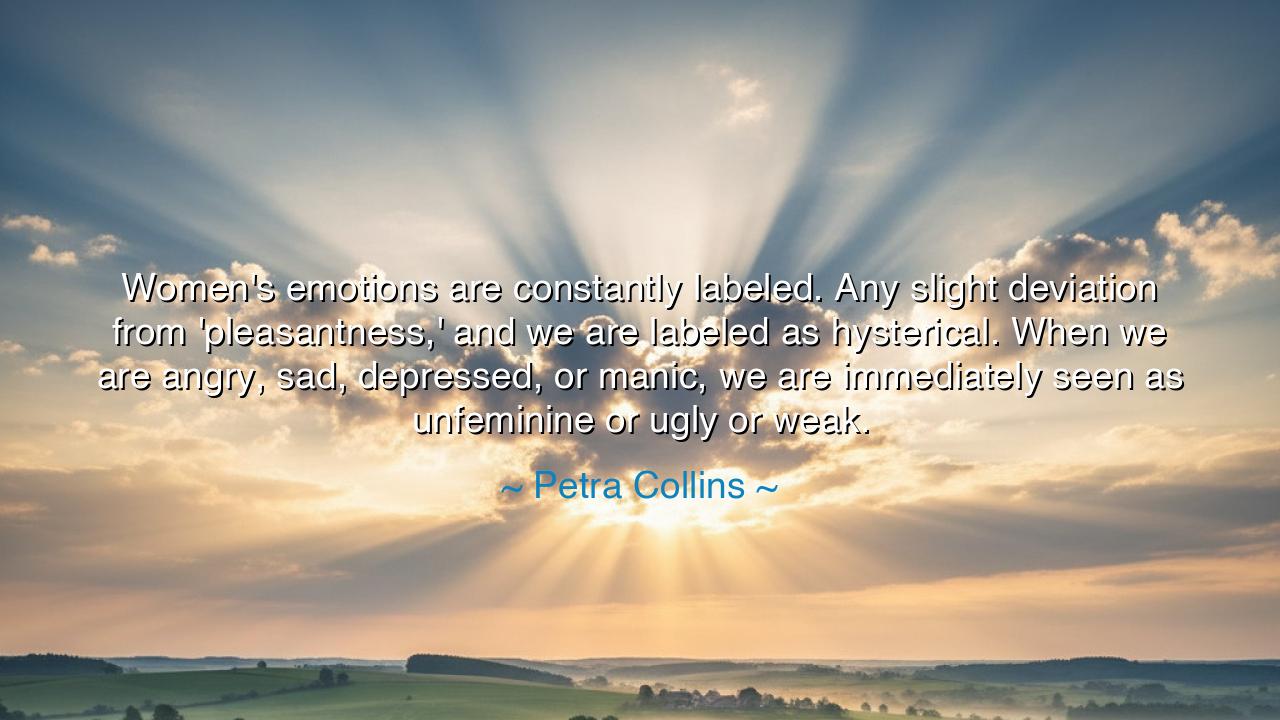
Women's emotions are constantly labeled. Any slight deviation
Women's emotions are constantly labeled. Any slight deviation from 'pleasantness,' and we are labeled as hysterical. When we are angry, sad, depressed, or manic, we are immediately seen as unfeminine or ugly or weak.






Hear now, O seekers of truth and justice, the words of Petra Collins, a voice of her generation and a mirror to the struggles of women in every age. “Women’s emotions are constantly labeled. Any slight deviation from ‘pleasantness,’ and we are labeled as hysterical. When we are angry, sad, depressed, or manic, we are immediately seen as unfeminine or ugly or weak.” In this lamentation lies an ancient wound—the distortion of womanhood through the eyes of a world that fears its power. Collins speaks not merely of modern bias, but of a long history of silencing, in which the authentic emotional spectrum of women has been reduced to caricature, condemned as irrational, ungraceful, or dangerous.
From the dawn of civilization, the emotions of women have been both feared and misunderstood. The Greeks, in their philosophy, spoke of “hysteria”—a word born from the Greek hystera, meaning womb. They believed that a woman’s body itself carried madness, that emotion was her disease and logic her absence. Through centuries, this falsehood persisted, from the witch trials of Europe to the asylums of the nineteenth century, where women who dared to grieve, protest, or express passion were branded as hysterical. Collins’ reflection carries the echo of those ancient injustices, reminding us that though the world has changed, the chains of perception have not fully broken.
Consider the story of Sylvia Plath, the poet who burned with feeling and intellect. Her art exposed the full expanse of the female heart—its beauty, fury, and sorrow—and yet she was often dismissed as unstable, her genius overshadowed by labels of “madness” and “melancholy.” In her fate, we see the truth of Collins’ words: that when a woman’s emotions transcend the boundaries of what society finds comfortable, she is made to bear the burden of judgment rather than understanding. Her sadness is pathologized, her anger condemned, her complexity reduced to fragility.
But beneath this injustice lies a greater truth—that these emotions are not signs of weakness, but of profound strength and awareness. To feel deeply is to live deeply, to perceive injustice, to love fiercely, to mourn the wounds of the world. When Collins defends the right to emotion, she defends the full humanity of women, affirming that power and tenderness, beauty and sorrow, coexist in every soul. It is not emotion that weakens, but repression that destroys. For when society demands constant pleasantness, it demands silence—and silence is the death of authenticity.
Let us also remember the example of Queen Elizabeth I, whose reign defied both the gender and emotional expectations of her time. She mastered her passions without erasing them, ruling with intellect, pride, and the fire of conviction. Her anger was not hysteria but command; her sadness not fragility but insight. In her, we see that the true strength of a woman lies not in the denial of emotion, but in the harmony of feeling and reason, courage and compassion.
The wisdom of Collins’ message is thus twofold: first, that emotion is a birthright, not a flaw; and second, that to label a woman’s emotion as weakness is to deny the divine balance of the human spirit. The anger of the oppressed, the sorrow of the wounded, the joy of the liberated—these are not dangers to society but the very forces that renew it. When women are permitted to express the full truth of their hearts, they restore honesty to the world itself.
Practical wisdom arises from this teaching. Do not judge emotion through the lens of gender; do not call passion hysteria or strength arrogance. Listen instead with understanding. In yourself, do not hide your depth for the comfort of others—feel, speak, and stand in your truth. And when you see another person shamed for their emotion, be their witness, not their accuser. For in compassion, justice is born.
Thus, let the words of Petra Collins echo through time: that the labeling of women’s emotions is not only a social habit, but a spiritual error. It is the denial of the wholeness of humanity. The task of every generation is to break these old chains—to see emotion not as a flaw to be corrected, but as a source of wisdom, creativity, and light. Only when all hearts are free to feel without judgment shall the world itself be truly whole.






AAdministratorAdministrator
Welcome, honored guests. Please leave a comment, we will respond soon